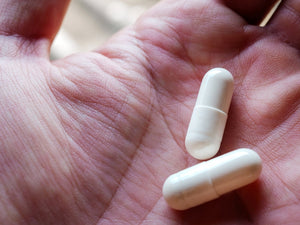Human trials so far report that NMN is well-tolerated over weeks to a few months, with no consistent serious adverse effects. However, long-term data are limited, so you should use it thoughtfully and with medical guidance.
If you are asking what are the side effects of NMN, you are not alone. A lot of people are getting really excited about NMN’s potential for longevity. But that excitement comes with concerns about biosafety and side effects. So, we have created a guide to help you figure out its science-backed safety.
In this article, we pull together safety results across multiple human studies and summarize them to paint a more transparent picture about NMN. Let’s dive in!
What Are The Side Effects Of NMN?
Most participants in published human trials experienced no consistent, clinically significant side effects. Routine labs and vital signs remained stable, and investigators frequently described NMN as safe and well-tolerated in the short term.
Still, because studies are small, we cannot yet guarantee long-term safety. Therefore, monitor how you feel and check in with your clinician.
What NMN Human Studies Actually Show About Safety
- Short-term tolerance is good. Across multiple trials, participants taking ~250–900 mg/day for 6–12 weeks did not show a consistent pattern of adverse effects, and clinical parameters stayed within normal limits.
- High doses are well-tolerated. Some studies escalated up to ~1,000–1,200 mg/day in short regimens. still without a new safety signal in those time frames.
- Timing matters for some outcomes. In older adults, afternoon NMN (vs morning) showed better lower-limb function and less drowsiness in one study.
Possible Side-effects Of NMN
NMN human trials have now found a consistent side-effect pattern. However, trials for a similar compound, nicotinamide, have shown several side effects, albeit at very high doses.
Nicotinamide (NAM) is a form of vitamin B3. It’s also an NAD+ booster like NMN and has been studied longer than NMN. Studies have shown that at very high doses NAM may cause a bunch of different side effects. Let’s review them in the following table:
|
Affected organ |
NAM dose |
Side effect |
|
Head |
1-18 g |
Headaches, nausea, dizziness. |
|
Pancreas |
2 g daily for 2 weeks |
Decrease insulin sensitivity. And increased oxidative stress. |
|
Liver |
3 or 9 g daily for 10 days |
Cell-injury, and liver-injury. Also fibrosis and cholestasis. |
|
Blood |
1.3 - 1.5 g daily for 24 weeks |
Cancer and cell death. |
|
Kidneys |
0.52 - 2 g daily for 3-6 months |
Cell death. |
Because these side effects are not of NMN, you should take them with a pinch of salt. However, since both these compounds boost NAD+, it’s not too farfetched to assume that at equivalently high doses, NMN may trigger similar adverse effects.
So the answer to the question “what are the side effects of NMN supplements” depends on your context. It’s best to consult with your clinician before you start, or if you experience any unwanted symptoms.
What Is A Safe Dose Of NMN?
Evidence-based dose ranges in human studies cluster around 250–900 mg/day for 6–12 weeks. Some extreme regimens can range between 1,200 - 2000 mg/day. The best advice here is to start low (250 mg/day) and slowly move towards a higher dose if you don’t see any effect.
Most clinical trials use 250-500 mg NMN per day. And it’s enough to produce noticeable changes within weeks. Timing also matters! One study found that taking NMN in the afternoon was more effective than taking it in the morning.
Simple Plan To Incorporate NMN Into Your Lifestyle
- Figure out what you want to improve using NMN (weight, muscles, cardiovascular health, etc.).
- Get some initial tests done to measure the parameter you want to change: for instance figure out your starting weight if you want to use NMN for weight loss.
- Start by taking 250 mg before lunch.
- Take 250 mg/day for 3-4 weeks.
- See if you notice any differences (for example, check your weight again).
- Adjust the dose if necessary. Make sure that you involve your clinical in this process.
Is It Safe To Take NMN During Pregnancy?
No! Clinical trials have not studied NMN’s safety during pregnancy. Therefore, it’s best to avoid it altogether if you are pregnant.
Speaking to your clinician is the best way to figure out your and your unborn child’s needs during pregnancy. They can redirect you to the best supplements that can support your and your baby’s healthy growth.
Can You Take NMN When Lactating Or Breast Feeding?
It’s best to avoid it. Again, there’s no studies that have tested NMN’s safety in breastfeeding mother-infant pairs.
Limited evidence suggests that NMN might actually benefit an infant's brain development. A study found that NMN in breast milk was associated with neurodevelopment. However, mothers in this study were not taking any NMN supplements.
Therefore, it’s still very early to recommend that breastfeeding mothers should incorporate NMN into their lifestyle. Talk to your clinician to help them figure this out with you better.
Should Cancer Patients Take NMN?
Cancer patients or those who are recovering from a recent cancer should avoid NMN. Currently there’s no real evidence that NMN might help with cancer. But there is some basis to believe that it might make things worse for cancer patients.
NMN provides the body with NAD+. NAD+ is used by cells to rejuvenate and grow. But it’s not selective in what cells it wants to help. That means that while it’s helping your regular cells grow, it might also extend the same courtesy to cancer cells.
Thus, if you have cancer, are recovering from it, or at risk of developing it, it’s best to talk to an oncologist before taking NMN. They can
Final Takeaway: What Are The Side Effects Of NMN?
In current human studies, NMN appears well-tolerated with no consistent serious adverse effects. However, long-term safety remains uncertain. Therefore, treat NMN like a precision tool.
Get a high-purity, third-party–tested option: HealthspanX Ultra Pure NMN™ 500 mg. If you and your clinician agree, begin low, track how you feel for two to four weeks, and adjust as needed.
FAQs
What Are The Side Effects Of NMN
Short-term trials in humans report good tolerability with no consistent serious adverse effects. Mild GI upset, headache, or sleep disturbance can occur but are not consistent.
What Are The Dangers Of Taking NMN
The main “danger” is the unknown: we lack multi-year data. People with cancer histories or on complex regimens or pregnant and breastfeeding mothers should avoid NMN.
Can NMN Cause Cancer
There is no human evidence that NMN causes cancer. However, mouse studies show that NMN is a double-edged sword that may promote tumor growth.
What Is The Best Time To Take NMN Supplement
In one study with older adults, afternoon dosing improved function and drowsiness without new safety issues better than morning dosing.
References
- Liao, G., Xie, Y., Peng, H., Li, T., Zou, X., Yue, F., Guo, J., & Rong, L. (2024). Advancements in NMN biotherapy and research updates in the field of digestive system diseases. Journal of translational medicine, 22(1), 805. https://doi.org/10.1186/s12967-024-05614-9
- Kim, M., Seol, J., Sato, T., Fukamizu, Y., Sakurai, T., & Okura, T. (2022). Effect of 12-Week Intake of Nicotinamide Mononucleotide on Sleep Quality, Fatigue, and Physical Performance in Older Japanese Adults: A Randomized, Double-Blind Placebo-Controlled Study. Nutrients, 14(4), 755. https://doi.org/10.3390/nu14040755
- Hwang, E. S., & Song, S. B. (2020). Possible Adverse Effects of High-Dose Nicotinamide: Mechanisms and Safety Assessment. Biomolecules, 10(5), 687. https://doi.org/10.3390/biom10050687
- Saito, Y., Sato, K., Jinno, S., Nakamura, Y., Nobukuni, T., Ogishima, S., Mizuno, S., Koshiba, S., Kuriyama, S., Ohneda, K., & Morifuji, M. (2023). Effect of Nicotinamide Mononucleotide Concentration in Human Milk on Neurodevelopmental Outcome: The Tohoku Medical Megabank Project Birth and Three-Generation Cohort Study. Nutrients, 16(1), 145. https://doi.org/10.3390/nu16010145







